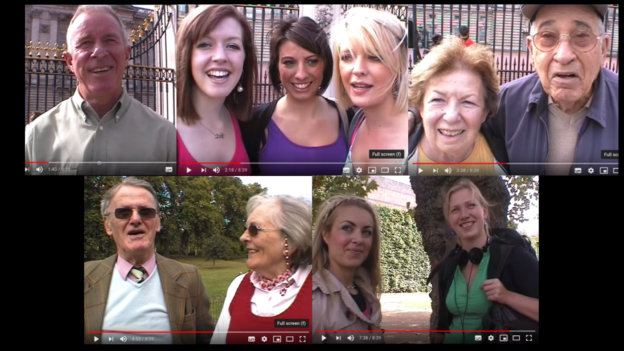Revisiting a video I made for YouTube in 2009 and teaching you some descriptive and idiomatic vocabulary in the process. Transcripts and video available.
[DOWNLOAD]
Introduction
Hello, you’re listening to episode 591, which is called London Native Speaker Interviews Revisited Part 1.
The plan in this episode is to revisit some videos I recorded 10 years ago…
We’re going to listen to the audio from one of those videos and break it all down in order to help you understand everything word for word, teaching you some lovely, descriptive and idiomatic vocabulary in the process.
This episode is a bit of a flashback to 10 years ago when I first started doing the podcast.
What happened 10 years ago Luke, in 2009?
Ooh, all sorts of things happened, but one of them was that I went into central London armed with my video camera, an Oyster card and a question to ask some members of the public: What is London really like?
What is London like? = tell me about London, describe London
I interviewed people in the street and edited the footage into a series of 5 videos which I published on YouTube, and the videos actually did very well! Part 1 now has 1.6 million views. Part 2 has 1 million.
You might be thinking – are you rich because of those videos? Nope. Not at all. I didn’t monetise them until after they’d got most of their views, or I couldn’t monetise them because of some background music. Anyway, that’s another story for another time – how YouTubers make or don’t make money from their videos.
I also published the videos and their audio tracks as episodes of this podcast in 2009. Some of you will have heard them and seen those videos.
I thought that this time it would be interesting to revisit those videos on the podcast because there’s loads of English to learn from them. When I published them on the podcast in 2009 I just published them with no commentary from me. It was just the video/audio with transcripts on the website.
But this time I’m not just going to play them again. Instead I’m going to go through the audio from the first video and kind of break it down bit by bit, explaining bits of vocabulary and generally commenting on things as we go. This is going to be a bit like one of those director’s commentary tracks that you get on DVDs, but the focus is mainly going to be on highlighting certain items of vocabulary and bits of pronunciation/accent that come up in the videos.
*Luke mentions his Avengers Endgame Spoiler Review, which you can listen to in the LEP App (in the App-only episodes category).*
If you want to watch the original video that I’m talking about here, you’ll find it embedded on the page for this episode on my website (A script is also available), it’s also in the LEP App (with a script in the notes) which you can download free from the app store on your phone – just search for Luke’s English Podcast App and you can just find it on my YouTube channel, which is Luke’s English Podcast on YouTube. The video is called London Native Speaker Interviews Part 1, or maybe London Video Interviews Part 1 (website), London Interviews Part 1 in the app.
So, let’s now travel back in time to 2009 and revisit Native English Speaker Interviews Part 1.
The theme of the videos is London – what’s it really like to live there? What are the good and bad things about living there?
So there’s a lot of descriptive vocabulary for describing cities and life in cities.
Video script available here https://teacherluke.co.uk/2010/03/25/london-video-interviews-pt-1/
Definitions of some vocabulary and expressions
What’s London really like?
This question: “What is it like?” means “tell me about it” or “how is it?”. It does not mean: “What do you like about London?”
e.g. What is London like? – it’s busy
What do you like about it? – I like the theatres
It’s gone to the dogs = everything is much worse now than it was before
grimy = dirty
to recharge your batteries = to give yourself some energy, by doing something pleasant and stimulating
to shout someone down = to disagree with someone loudly in order to stop them talking
to take advantage of something = to use something good which is available to you
commuting = travelling from home to work every day
